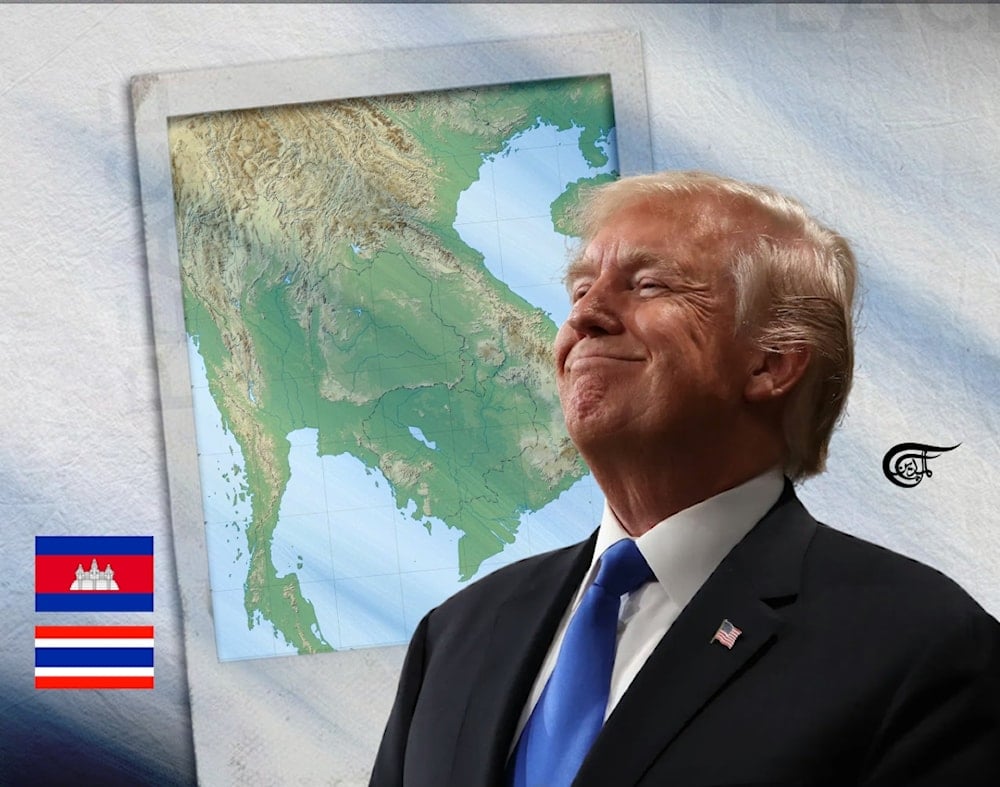Why the US is unqualified to promote peace between Thailand and Cambodia
The US lacks the neutrality, record, and regional credibility to mediate the Thailand-Cambodia conflict, making ASEAN and China more viable peace brokers.
-

For a retreating US administration to tout peace against a track record of aggression and belligerence is a recipe for further unrest. (Al Mayadeen English; Illustrated by Batoul Chamas)
Washington’s calls to dial-down tensions between Cambodia and Thailand have few takers.
In recent weeks, cross-border hostilities between the two Southeast Asian powers have intensified sharply, with exchange of heavy artillery, Thai airstrikes on Cambodian military targets, and rising casualties, tossing the Association of Southeast Asian Nations (ASEAN) into a tough spot. The root of the crisis goes back over a century, and the absence of a clear floor beneath tensions underlines the gravity of a situation with the potential to flare up.
"Cambodia asked for an immediate ceasefire, unconditionally, and we also call for the peaceful solution of the dispute," stated Cambodia's ambassador to the UN, Chhea Keo, during a closed-door UN Security Council meeting this week.
But Washington’s calls for calm and restraint deserve considerable pushback, given its history of fueling geopolitical tensions and unwarranted military adventurism when expedient.
First, Washington’s alignment with Thailand – a key US partner – defeats the idea of credible neutrality. In order for the Trump administration to practice any meaningful leverage, it must first demonstrate that Washington has succeeded in coordinating expectations among diverse Southeast Asian nations to the benefit of regional peace.
This is where the posturing falls flat. Washington has spared no effort to complicate so-called “freedom of navigation” operations in the Indo-Pacific, and while it commits in rhetoric to ASEAN’s more cooperative Indo-Pacific strategy for stability, its endorsement of counterproductive groupings such as AUKUS and the Quadrilateral Security Dialogue (QUAD) suggests a penchant for escalation. Resolving the decades-old Cambodia-Thailand border challenge demands initiative from the outset: where were loud US appeals for de-escalation when competing accounts of soldier deaths eroded cross-border trust? A demonstrated track-record of preventing simmering hostilities in the current context is notably absent, presenting a compelling case for Cambodia, Thailand, and ASEAN to downplay US intent.
Washington’s interventionist role in the Philippines-China tensions is another major proof point for deliberate escalation. Washington, which claims to promote the stability of the Indo-Pacific, has been pressing Manila to hold tight to the US-supplied Typhon missile system, conducting counterproductive drills, and acting as a legal outlier on issues of genuine stability concerning the South China Sea. For the Trump administration, to stick its neck out for Cambodia or Thailand is thus a mirage at best. ASEAN has been tasked with promoting its policy of “non-interference” to resolve any conflicts through peaceful means, and skepticism over that role from Thailand suggests that the situation is far more delicate than what empty US calls for de-escalation indicate.
Had this conflict involved US assets, or considerable stakes – be it economic or geopolitical interests geared towards China – the outcry and regional alarm from US hawks would have been striking. This has been reflected in Washington’s reported push for dangerous war-gaming with Manila and Tokyo over a so-called “Taiwan” contingency, which it sees as a way to justify US missile unit deployment. With these glaring shortcomings on regional peace, penchant for military escalation, and geopolitical signaling occupying the core of US policy priorities in the region, US calls for a ceasefire in the current crisis mean little.
Actual leverage can stem from entities beyond the US. ASEAN, under Malaysia’s chairmanship, has been quick to promote momentum towards a ceasefire proposal – and early support from Thailand and Cambodia suggests it could break ground if hostilities settle. ASEAN has what the US does not: a track record of forging consensus on peace-building, the support of major regional powers – including China – and demonstrated autonomy on matters that concern regional stability or possible escalation. These priorities were on display during early consensus-building during the crisis in Myanmar – an event that the Biden administration targeted with sanctions, only to empower parts of the military junta.
China’s considerable economic and political ties with Thailand and Cambodia also drill a hole in Washington’s confidence to see an effective solution through. One of the reasons why reliance on US conflict-resolution should remain minimal is because Washington is likely to operate from the sidelines, rather than assume a more direct role in bringing parties together. For instance, any acceptable solution would likely require the blessings of ASEAN, which is unsettled by the idea that two of its member states are on the brink of war.
On the other hand, China’s recent flurry of engagements with Southeast Asian powers – including on the topic of enduring regional stability – make it a more influential stakeholder in coordinating or managing expectations for long-term peace. Particularly when ASEAN has endorsed China’s “crucial role in promoting peace, stability, prosperity, and sustainable development in regional and international affairs” at a major trilateral summit in May.
Thus, for a retreating US administration to tout peace against a track record of aggression and belligerence is a recipe for further unrest. US platitudes, as witnessed in the past, are reminders that Washington is more of an irritant rather than a driver of peace.

 Hannan Hussain
Hannan Hussain
 5 Min Read
5 Min Read











